Literature Review on the Role of Power and Politics in Management
VerifiedAdded on 2020/05/28
|14
|3383
|130
Report
AI Summary
This literature review examines the critical role of power and politics in management and leadership within business organizations, using IBM as a case study. The report explores various sources of power, including legitimate, reward, coercive, expert, and referent power, and how they influence employee behavior. It delves into organizational politics, discussing the antecedents of political behavior at both individual and organizational levels, and highlights the potential negative impacts of power abuse and political maneuvering on organizational outcomes. The review also discusses how leaders and managers leverage power and politics to enhance productivity and profitability. The report concludes with recommendations for managing power dynamics effectively within organizations.
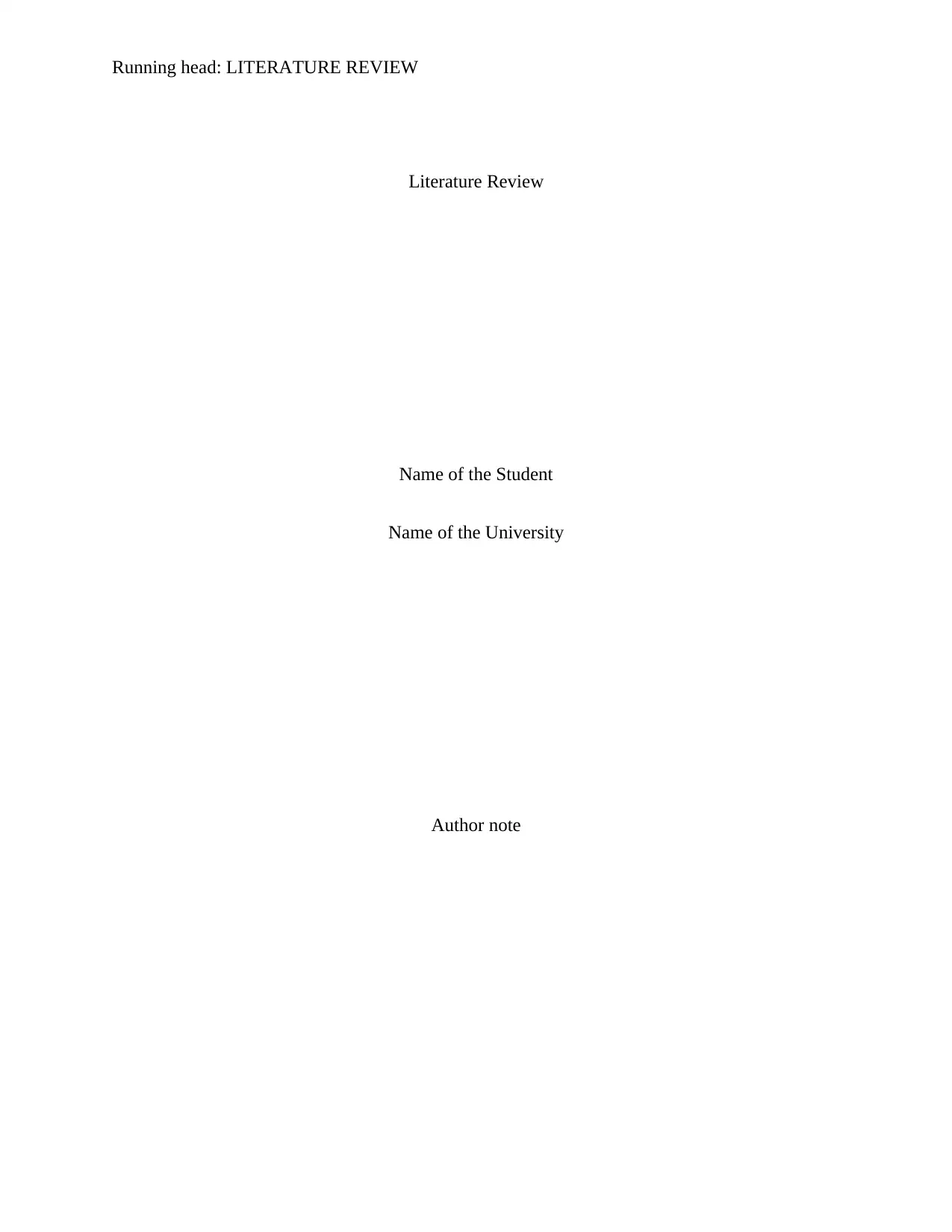
Running head: LITERATURE REVIEW
Literature Review
Name of the Student
Name of the University
Author note
Literature Review
Name of the Student
Name of the University
Author note
Paraphrase This Document
Need a fresh take? Get an instant paraphrase of this document with our AI Paraphraser
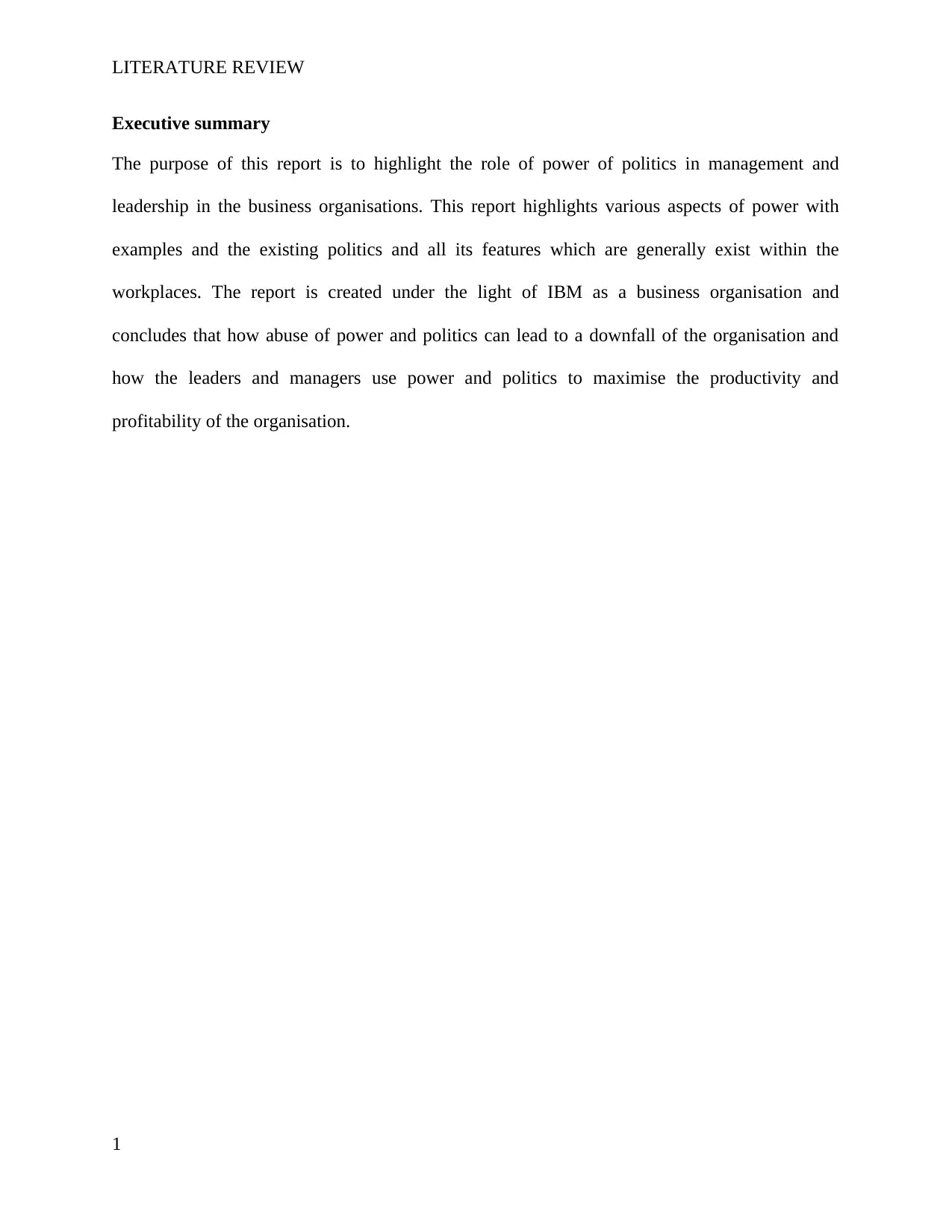
LITERATURE REVIEW
Executive summary
The purpose of this report is to highlight the role of power of politics in management and
leadership in the business organisations. This report highlights various aspects of power with
examples and the existing politics and all its features which are generally exist within the
workplaces. The report is created under the light of IBM as a business organisation and
concludes that how abuse of power and politics can lead to a downfall of the organisation and
how the leaders and managers use power and politics to maximise the productivity and
profitability of the organisation.
1
Executive summary
The purpose of this report is to highlight the role of power of politics in management and
leadership in the business organisations. This report highlights various aspects of power with
examples and the existing politics and all its features which are generally exist within the
workplaces. The report is created under the light of IBM as a business organisation and
concludes that how abuse of power and politics can lead to a downfall of the organisation and
how the leaders and managers use power and politics to maximise the productivity and
profitability of the organisation.
1
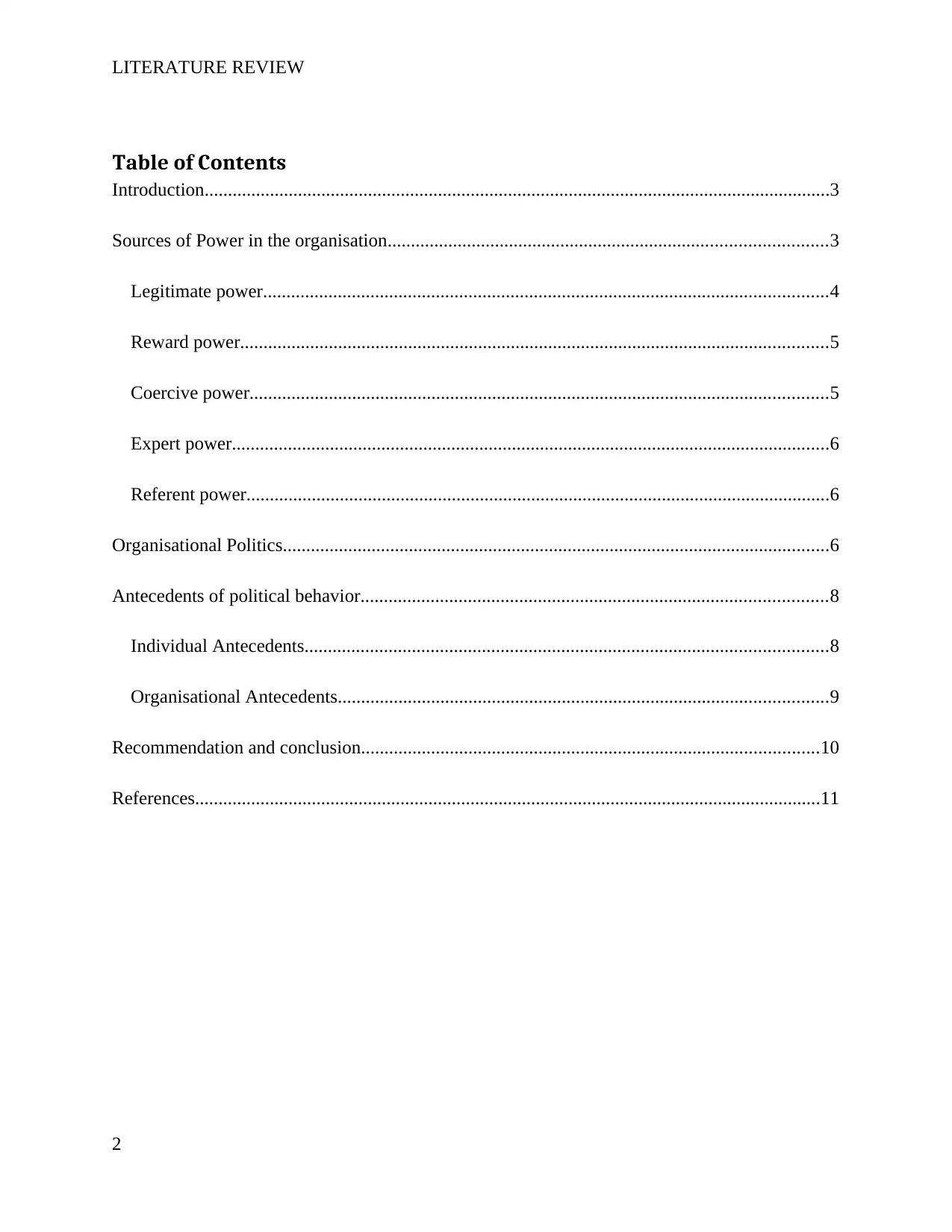
LITERATURE REVIEW
Table of Contents
Introduction......................................................................................................................................3
Sources of Power in the organisation..............................................................................................3
Legitimate power.........................................................................................................................4
Reward power..............................................................................................................................5
Coercive power............................................................................................................................5
Expert power................................................................................................................................6
Referent power.............................................................................................................................6
Organisational Politics.....................................................................................................................6
Antecedents of political behavior....................................................................................................8
Individual Antecedents................................................................................................................8
Organisational Antecedents.........................................................................................................9
Recommendation and conclusion..................................................................................................10
References......................................................................................................................................11
2
Table of Contents
Introduction......................................................................................................................................3
Sources of Power in the organisation..............................................................................................3
Legitimate power.........................................................................................................................4
Reward power..............................................................................................................................5
Coercive power............................................................................................................................5
Expert power................................................................................................................................6
Referent power.............................................................................................................................6
Organisational Politics.....................................................................................................................6
Antecedents of political behavior....................................................................................................8
Individual Antecedents................................................................................................................8
Organisational Antecedents.........................................................................................................9
Recommendation and conclusion..................................................................................................10
References......................................................................................................................................11
2
⊘ This is a preview!⊘
Do you want full access?
Subscribe today to unlock all pages.

Trusted by 1+ million students worldwide
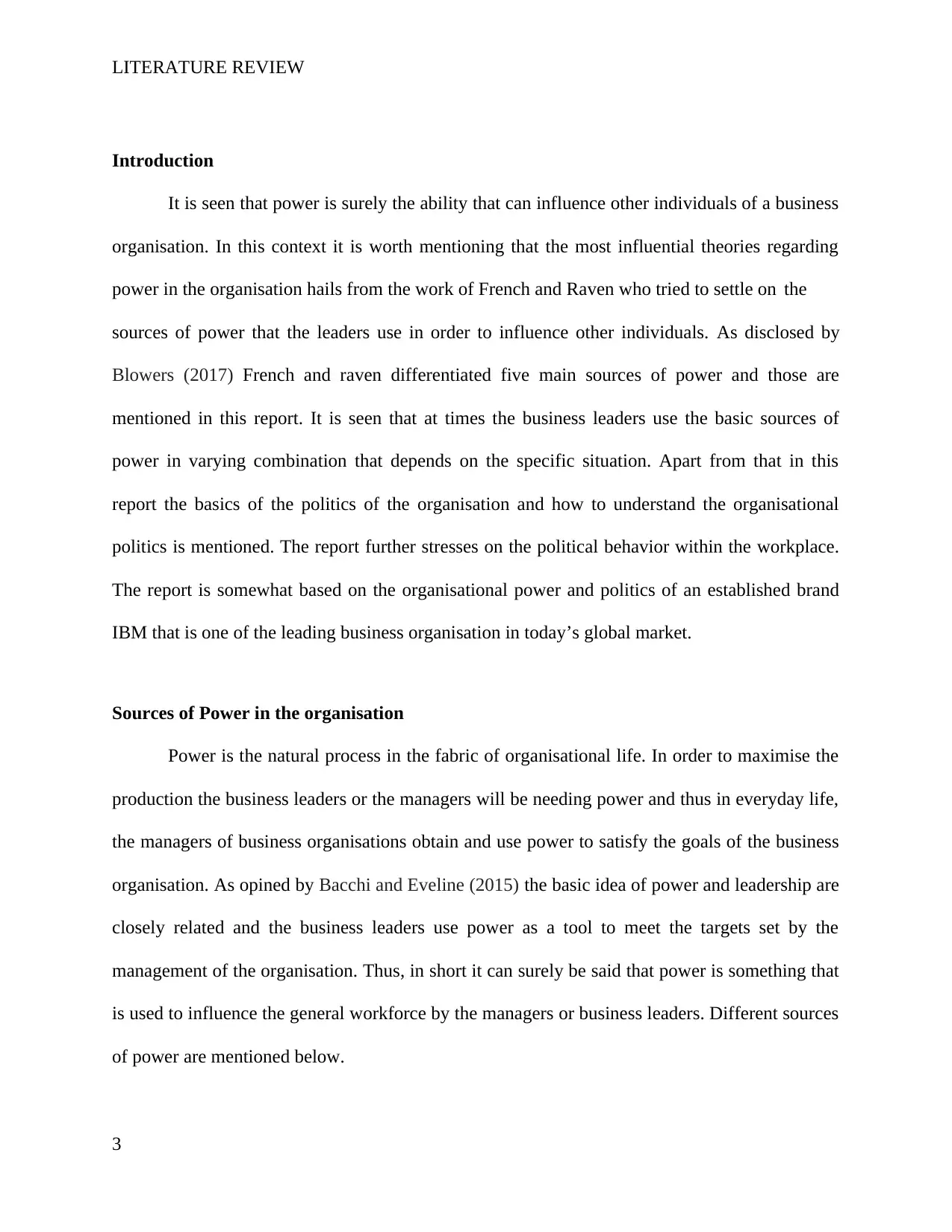
LITERATURE REVIEW
Introduction
It is seen that power is surely the ability that can influence other individuals of a business
organisation. In this context it is worth mentioning that the most influential theories regarding
power in the organisation hails from the work of French and Raven who tried to settle on the
sources of power that the leaders use in order to influence other individuals. As disclosed by
Blowers (2017) French and raven differentiated five main sources of power and those are
mentioned in this report. It is seen that at times the business leaders use the basic sources of
power in varying combination that depends on the specific situation. Apart from that in this
report the basics of the politics of the organisation and how to understand the organisational
politics is mentioned. The report further stresses on the political behavior within the workplace.
The report is somewhat based on the organisational power and politics of an established brand
IBM that is one of the leading business organisation in today’s global market.
Sources of Power in the organisation
Power is the natural process in the fabric of organisational life. In order to maximise the
production the business leaders or the managers will be needing power and thus in everyday life,
the managers of business organisations obtain and use power to satisfy the goals of the business
organisation. As opined by Bacchi and Eveline (2015) the basic idea of power and leadership are
closely related and the business leaders use power as a tool to meet the targets set by the
management of the organisation. Thus, in short it can surely be said that power is something that
is used to influence the general workforce by the managers or business leaders. Different sources
of power are mentioned below.
3
Introduction
It is seen that power is surely the ability that can influence other individuals of a business
organisation. In this context it is worth mentioning that the most influential theories regarding
power in the organisation hails from the work of French and Raven who tried to settle on the
sources of power that the leaders use in order to influence other individuals. As disclosed by
Blowers (2017) French and raven differentiated five main sources of power and those are
mentioned in this report. It is seen that at times the business leaders use the basic sources of
power in varying combination that depends on the specific situation. Apart from that in this
report the basics of the politics of the organisation and how to understand the organisational
politics is mentioned. The report further stresses on the political behavior within the workplace.
The report is somewhat based on the organisational power and politics of an established brand
IBM that is one of the leading business organisation in today’s global market.
Sources of Power in the organisation
Power is the natural process in the fabric of organisational life. In order to maximise the
production the business leaders or the managers will be needing power and thus in everyday life,
the managers of business organisations obtain and use power to satisfy the goals of the business
organisation. As opined by Bacchi and Eveline (2015) the basic idea of power and leadership are
closely related and the business leaders use power as a tool to meet the targets set by the
management of the organisation. Thus, in short it can surely be said that power is something that
is used to influence the general workforce by the managers or business leaders. Different sources
of power are mentioned below.
3
Paraphrase This Document
Need a fresh take? Get an instant paraphrase of this document with our AI Paraphraser
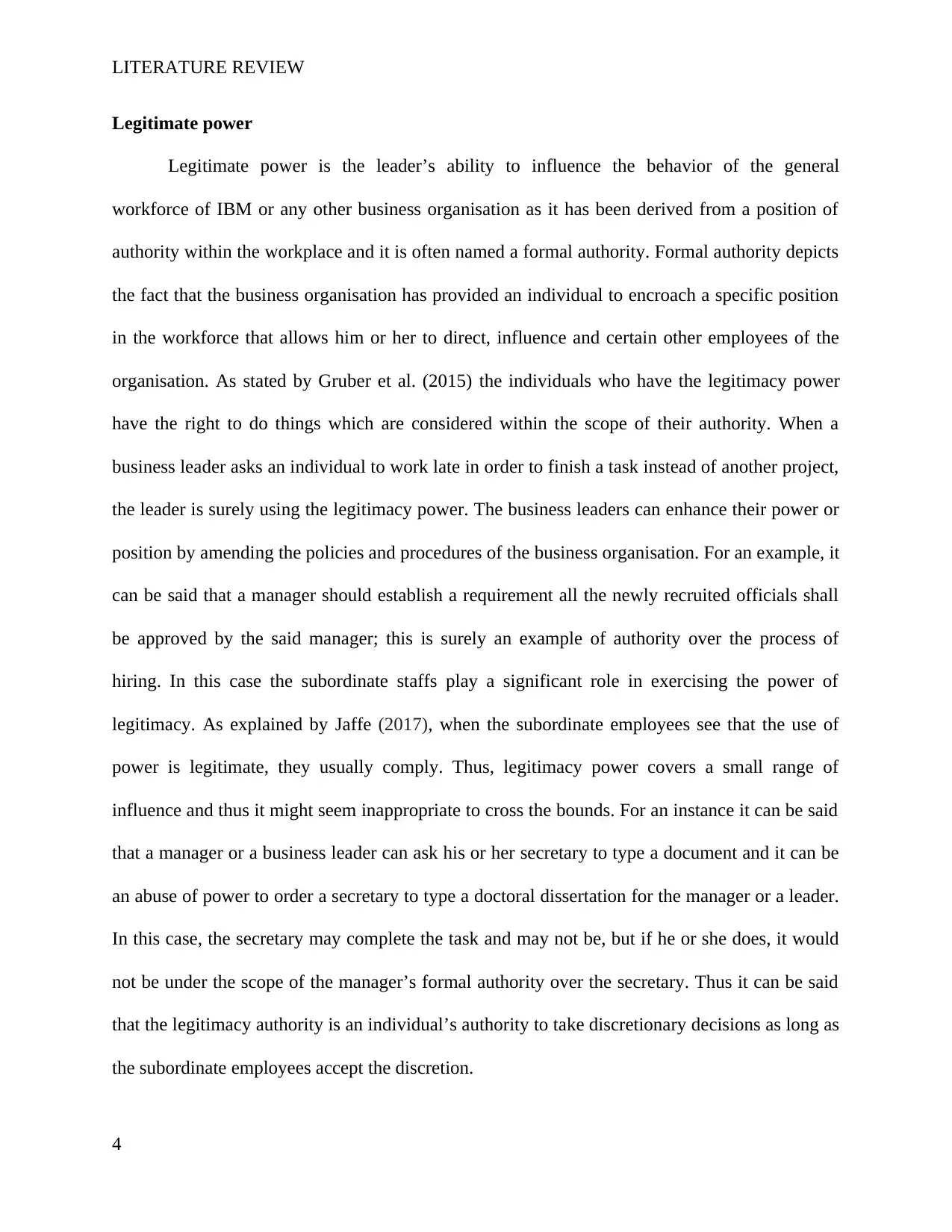
LITERATURE REVIEW
Legitimate power
Legitimate power is the leader’s ability to influence the behavior of the general
workforce of IBM or any other business organisation as it has been derived from a position of
authority within the workplace and it is often named a formal authority. Formal authority depicts
the fact that the business organisation has provided an individual to encroach a specific position
in the workforce that allows him or her to direct, influence and certain other employees of the
organisation. As stated by Gruber et al. (2015) the individuals who have the legitimacy power
have the right to do things which are considered within the scope of their authority. When a
business leader asks an individual to work late in order to finish a task instead of another project,
the leader is surely using the legitimacy power. The business leaders can enhance their power or
position by amending the policies and procedures of the business organisation. For an example, it
can be said that a manager should establish a requirement all the newly recruited officials shall
be approved by the said manager; this is surely an example of authority over the process of
hiring. In this case the subordinate staffs play a significant role in exercising the power of
legitimacy. As explained by Jaffe (2017), when the subordinate employees see that the use of
power is legitimate, they usually comply. Thus, legitimacy power covers a small range of
influence and thus it might seem inappropriate to cross the bounds. For an instance it can be said
that a manager or a business leader can ask his or her secretary to type a document and it can be
an abuse of power to order a secretary to type a doctoral dissertation for the manager or a leader.
In this case, the secretary may complete the task and may not be, but if he or she does, it would
not be under the scope of the manager’s formal authority over the secretary. Thus it can be said
that the legitimacy authority is an individual’s authority to take discretionary decisions as long as
the subordinate employees accept the discretion.
4
Legitimate power
Legitimate power is the leader’s ability to influence the behavior of the general
workforce of IBM or any other business organisation as it has been derived from a position of
authority within the workplace and it is often named a formal authority. Formal authority depicts
the fact that the business organisation has provided an individual to encroach a specific position
in the workforce that allows him or her to direct, influence and certain other employees of the
organisation. As stated by Gruber et al. (2015) the individuals who have the legitimacy power
have the right to do things which are considered within the scope of their authority. When a
business leader asks an individual to work late in order to finish a task instead of another project,
the leader is surely using the legitimacy power. The business leaders can enhance their power or
position by amending the policies and procedures of the business organisation. For an example, it
can be said that a manager should establish a requirement all the newly recruited officials shall
be approved by the said manager; this is surely an example of authority over the process of
hiring. In this case the subordinate staffs play a significant role in exercising the power of
legitimacy. As explained by Jaffe (2017), when the subordinate employees see that the use of
power is legitimate, they usually comply. Thus, legitimacy power covers a small range of
influence and thus it might seem inappropriate to cross the bounds. For an instance it can be said
that a manager or a business leader can ask his or her secretary to type a document and it can be
an abuse of power to order a secretary to type a doctoral dissertation for the manager or a leader.
In this case, the secretary may complete the task and may not be, but if he or she does, it would
not be under the scope of the manager’s formal authority over the secretary. Thus it can be said
that the legitimacy authority is an individual’s authority to take discretionary decisions as long as
the subordinate employees accept the discretion.
4
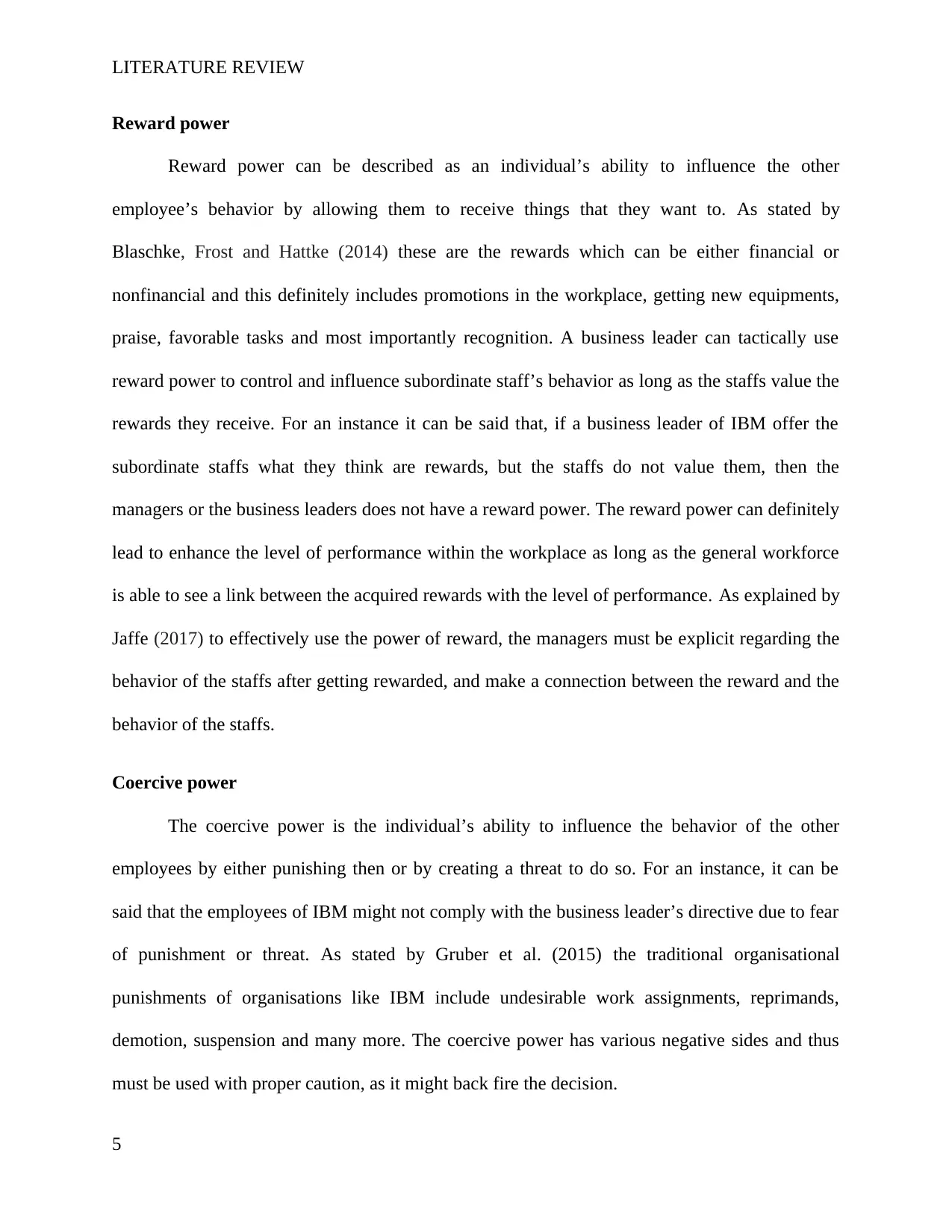
LITERATURE REVIEW
Reward power
Reward power can be described as an individual’s ability to influence the other
employee’s behavior by allowing them to receive things that they want to. As stated by
Blaschke, Frost and Hattke (2014) these are the rewards which can be either financial or
nonfinancial and this definitely includes promotions in the workplace, getting new equipments,
praise, favorable tasks and most importantly recognition. A business leader can tactically use
reward power to control and influence subordinate staff’s behavior as long as the staffs value the
rewards they receive. For an instance it can be said that, if a business leader of IBM offer the
subordinate staffs what they think are rewards, but the staffs do not value them, then the
managers or the business leaders does not have a reward power. The reward power can definitely
lead to enhance the level of performance within the workplace as long as the general workforce
is able to see a link between the acquired rewards with the level of performance. As explained by
Jaffe (2017) to effectively use the power of reward, the managers must be explicit regarding the
behavior of the staffs after getting rewarded, and make a connection between the reward and the
behavior of the staffs.
Coercive power
The coercive power is the individual’s ability to influence the behavior of the other
employees by either punishing then or by creating a threat to do so. For an instance, it can be
said that the employees of IBM might not comply with the business leader’s directive due to fear
of punishment or threat. As stated by Gruber et al. (2015) the traditional organisational
punishments of organisations like IBM include undesirable work assignments, reprimands,
demotion, suspension and many more. The coercive power has various negative sides and thus
must be used with proper caution, as it might back fire the decision.
5
Reward power
Reward power can be described as an individual’s ability to influence the other
employee’s behavior by allowing them to receive things that they want to. As stated by
Blaschke, Frost and Hattke (2014) these are the rewards which can be either financial or
nonfinancial and this definitely includes promotions in the workplace, getting new equipments,
praise, favorable tasks and most importantly recognition. A business leader can tactically use
reward power to control and influence subordinate staff’s behavior as long as the staffs value the
rewards they receive. For an instance it can be said that, if a business leader of IBM offer the
subordinate staffs what they think are rewards, but the staffs do not value them, then the
managers or the business leaders does not have a reward power. The reward power can definitely
lead to enhance the level of performance within the workplace as long as the general workforce
is able to see a link between the acquired rewards with the level of performance. As explained by
Jaffe (2017) to effectively use the power of reward, the managers must be explicit regarding the
behavior of the staffs after getting rewarded, and make a connection between the reward and the
behavior of the staffs.
Coercive power
The coercive power is the individual’s ability to influence the behavior of the other
employees by either punishing then or by creating a threat to do so. For an instance, it can be
said that the employees of IBM might not comply with the business leader’s directive due to fear
of punishment or threat. As stated by Gruber et al. (2015) the traditional organisational
punishments of organisations like IBM include undesirable work assignments, reprimands,
demotion, suspension and many more. The coercive power has various negative sides and thus
must be used with proper caution, as it might back fire the decision.
5
⊘ This is a preview!⊘
Do you want full access?
Subscribe today to unlock all pages.

Trusted by 1+ million students worldwide
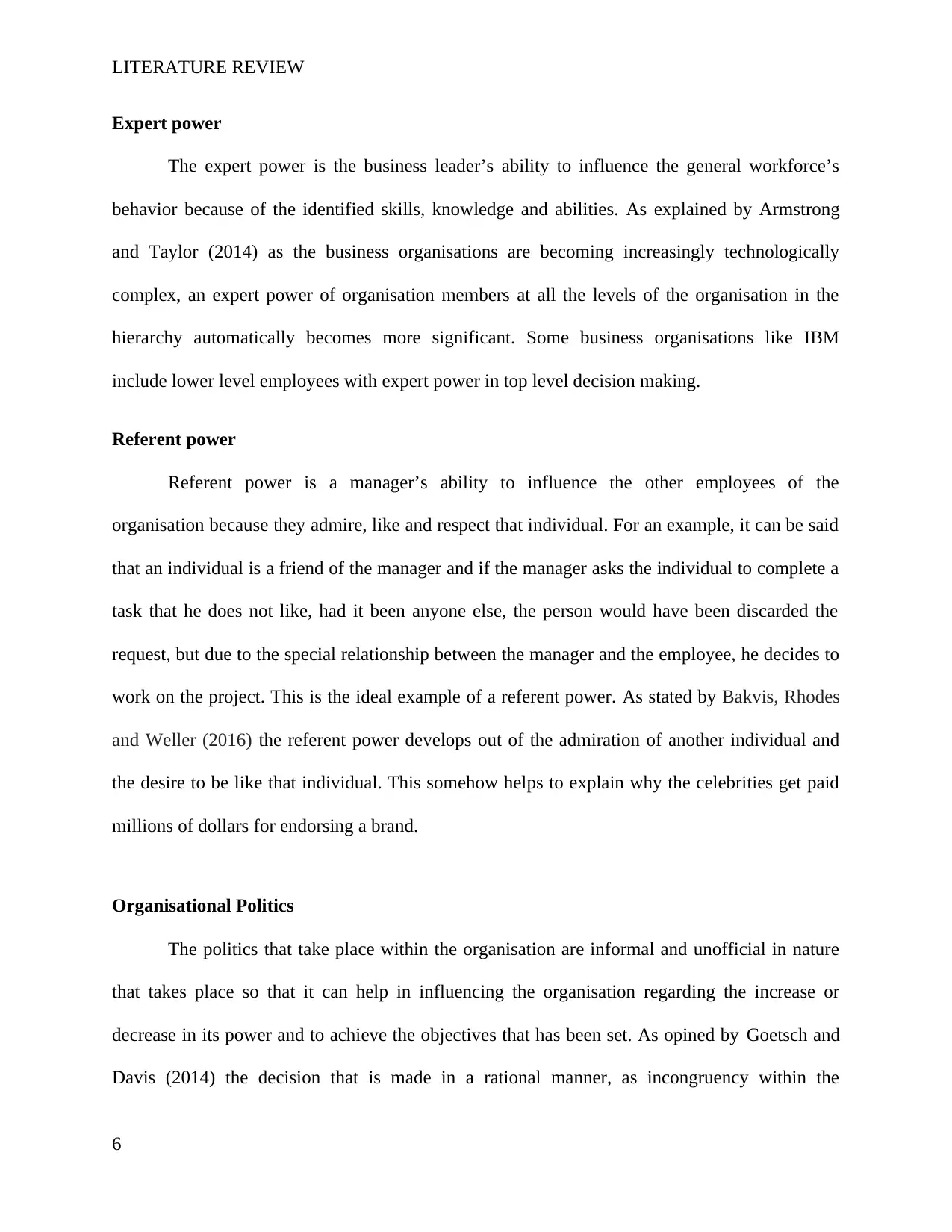
LITERATURE REVIEW
Expert power
The expert power is the business leader’s ability to influence the general workforce’s
behavior because of the identified skills, knowledge and abilities. As explained by Armstrong
and Taylor (2014) as the business organisations are becoming increasingly technologically
complex, an expert power of organisation members at all the levels of the organisation in the
hierarchy automatically becomes more significant. Some business organisations like IBM
include lower level employees with expert power in top level decision making.
Referent power
Referent power is a manager’s ability to influence the other employees of the
organisation because they admire, like and respect that individual. For an example, it can be said
that an individual is a friend of the manager and if the manager asks the individual to complete a
task that he does not like, had it been anyone else, the person would have been discarded the
request, but due to the special relationship between the manager and the employee, he decides to
work on the project. This is the ideal example of a referent power. As stated by Bakvis, Rhodes
and Weller (2016) the referent power develops out of the admiration of another individual and
the desire to be like that individual. This somehow helps to explain why the celebrities get paid
millions of dollars for endorsing a brand.
Organisational Politics
The politics that take place within the organisation are informal and unofficial in nature
that takes place so that it can help in influencing the organisation regarding the increase or
decrease in its power and to achieve the objectives that has been set. As opined by Goetsch and
Davis (2014) the decision that is made in a rational manner, as incongruency within the
6
Expert power
The expert power is the business leader’s ability to influence the general workforce’s
behavior because of the identified skills, knowledge and abilities. As explained by Armstrong
and Taylor (2014) as the business organisations are becoming increasingly technologically
complex, an expert power of organisation members at all the levels of the organisation in the
hierarchy automatically becomes more significant. Some business organisations like IBM
include lower level employees with expert power in top level decision making.
Referent power
Referent power is a manager’s ability to influence the other employees of the
organisation because they admire, like and respect that individual. For an example, it can be said
that an individual is a friend of the manager and if the manager asks the individual to complete a
task that he does not like, had it been anyone else, the person would have been discarded the
request, but due to the special relationship between the manager and the employee, he decides to
work on the project. This is the ideal example of a referent power. As stated by Bakvis, Rhodes
and Weller (2016) the referent power develops out of the admiration of another individual and
the desire to be like that individual. This somehow helps to explain why the celebrities get paid
millions of dollars for endorsing a brand.
Organisational Politics
The politics that take place within the organisation are informal and unofficial in nature
that takes place so that it can help in influencing the organisation regarding the increase or
decrease in its power and to achieve the objectives that has been set. As opined by Goetsch and
Davis (2014) the decision that is made in a rational manner, as incongruency within the
6
Paraphrase This Document
Need a fresh take? Get an instant paraphrase of this document with our AI Paraphraser
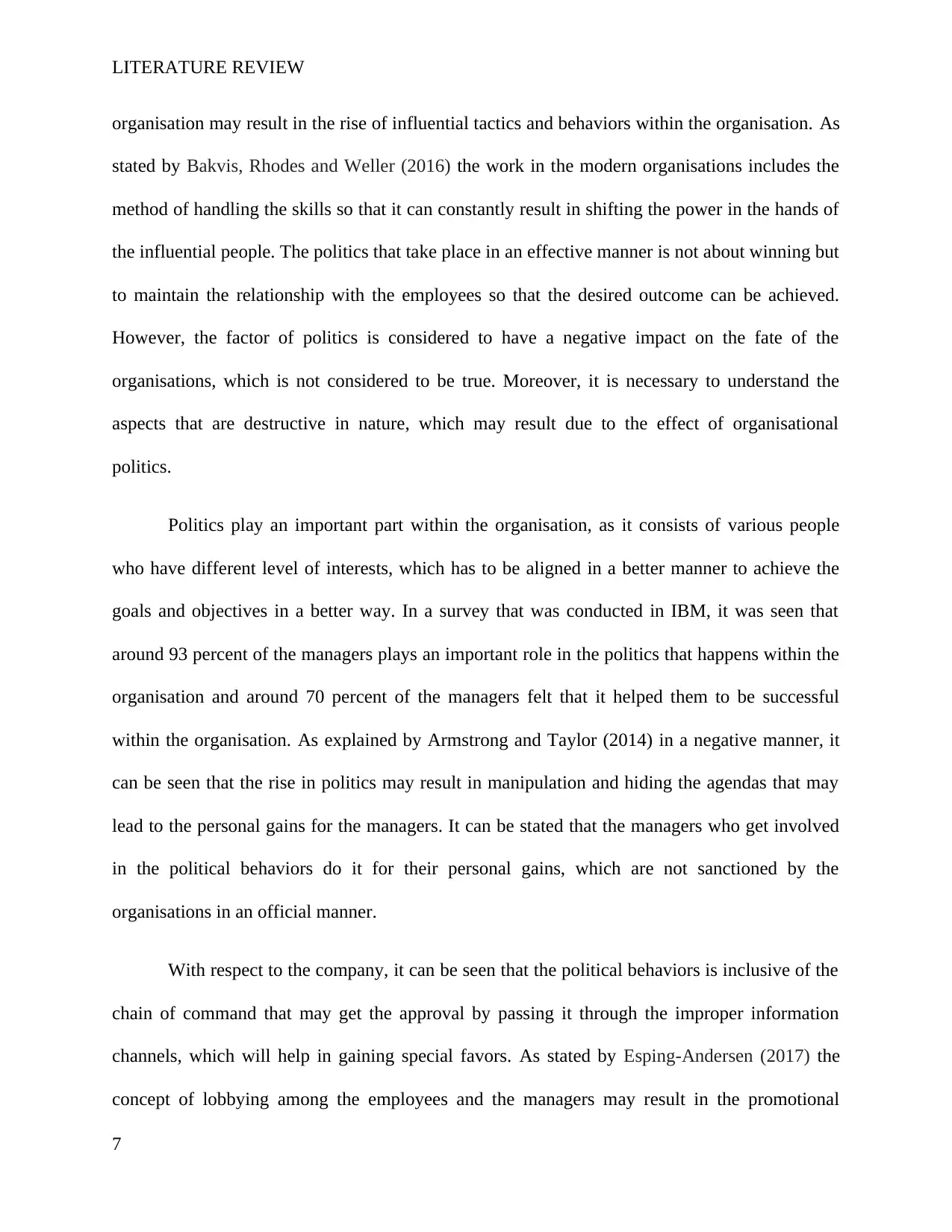
LITERATURE REVIEW
organisation may result in the rise of influential tactics and behaviors within the organisation. As
stated by Bakvis, Rhodes and Weller (2016) the work in the modern organisations includes the
method of handling the skills so that it can constantly result in shifting the power in the hands of
the influential people. The politics that take place in an effective manner is not about winning but
to maintain the relationship with the employees so that the desired outcome can be achieved.
However, the factor of politics is considered to have a negative impact on the fate of the
organisations, which is not considered to be true. Moreover, it is necessary to understand the
aspects that are destructive in nature, which may result due to the effect of organisational
politics.
Politics play an important part within the organisation, as it consists of various people
who have different level of interests, which has to be aligned in a better manner to achieve the
goals and objectives in a better way. In a survey that was conducted in IBM, it was seen that
around 93 percent of the managers plays an important role in the politics that happens within the
organisation and around 70 percent of the managers felt that it helped them to be successful
within the organisation. As explained by Armstrong and Taylor (2014) in a negative manner, it
can be seen that the rise in politics may result in manipulation and hiding the agendas that may
lead to the personal gains for the managers. It can be stated that the managers who get involved
in the political behaviors do it for their personal gains, which are not sanctioned by the
organisations in an official manner.
With respect to the company, it can be seen that the political behaviors is inclusive of the
chain of command that may get the approval by passing it through the improper information
channels, which will help in gaining special favors. As stated by Esping-Andersen (2017) the
concept of lobbying among the employees and the managers may result in the promotional
7
organisation may result in the rise of influential tactics and behaviors within the organisation. As
stated by Bakvis, Rhodes and Weller (2016) the work in the modern organisations includes the
method of handling the skills so that it can constantly result in shifting the power in the hands of
the influential people. The politics that take place in an effective manner is not about winning but
to maintain the relationship with the employees so that the desired outcome can be achieved.
However, the factor of politics is considered to have a negative impact on the fate of the
organisations, which is not considered to be true. Moreover, it is necessary to understand the
aspects that are destructive in nature, which may result due to the effect of organisational
politics.
Politics play an important part within the organisation, as it consists of various people
who have different level of interests, which has to be aligned in a better manner to achieve the
goals and objectives in a better way. In a survey that was conducted in IBM, it was seen that
around 93 percent of the managers plays an important role in the politics that happens within the
organisation and around 70 percent of the managers felt that it helped them to be successful
within the organisation. As explained by Armstrong and Taylor (2014) in a negative manner, it
can be seen that the rise in politics may result in manipulation and hiding the agendas that may
lead to the personal gains for the managers. It can be stated that the managers who get involved
in the political behaviors do it for their personal gains, which are not sanctioned by the
organisations in an official manner.
With respect to the company, it can be seen that the political behaviors is inclusive of the
chain of command that may get the approval by passing it through the improper information
channels, which will help in gaining special favors. As stated by Esping-Andersen (2017) the
concept of lobbying among the employees and the managers may result in the promotional
7
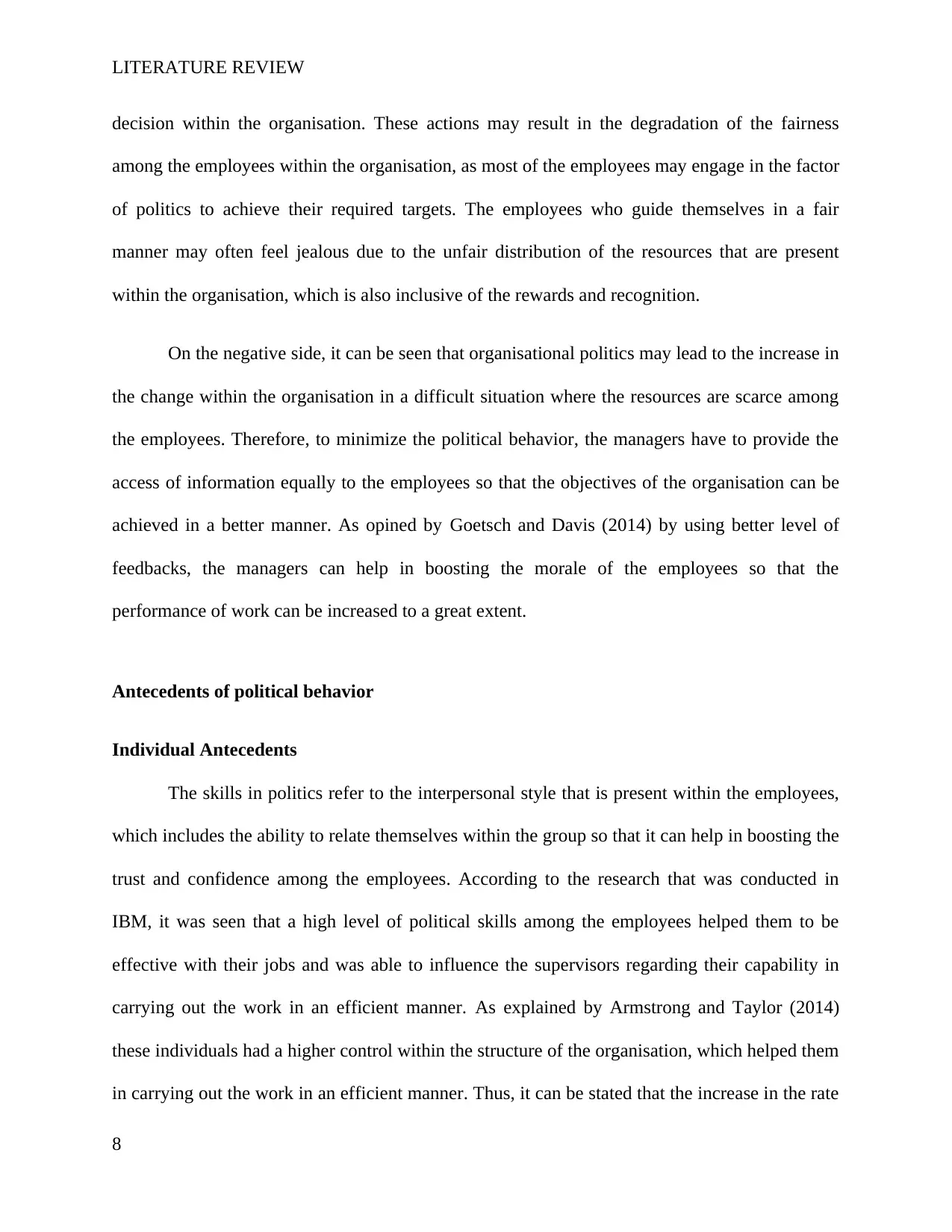
LITERATURE REVIEW
decision within the organisation. These actions may result in the degradation of the fairness
among the employees within the organisation, as most of the employees may engage in the factor
of politics to achieve their required targets. The employees who guide themselves in a fair
manner may often feel jealous due to the unfair distribution of the resources that are present
within the organisation, which is also inclusive of the rewards and recognition.
On the negative side, it can be seen that organisational politics may lead to the increase in
the change within the organisation in a difficult situation where the resources are scarce among
the employees. Therefore, to minimize the political behavior, the managers have to provide the
access of information equally to the employees so that the objectives of the organisation can be
achieved in a better manner. As opined by Goetsch and Davis (2014) by using better level of
feedbacks, the managers can help in boosting the morale of the employees so that the
performance of work can be increased to a great extent.
Antecedents of political behavior
Individual Antecedents
The skills in politics refer to the interpersonal style that is present within the employees,
which includes the ability to relate themselves within the group so that it can help in boosting the
trust and confidence among the employees. According to the research that was conducted in
IBM, it was seen that a high level of political skills among the employees helped them to be
effective with their jobs and was able to influence the supervisors regarding their capability in
carrying out the work in an efficient manner. As explained by Armstrong and Taylor (2014)
these individuals had a higher control within the structure of the organisation, which helped them
in carrying out the work in an efficient manner. Thus, it can be stated that the increase in the rate
8
decision within the organisation. These actions may result in the degradation of the fairness
among the employees within the organisation, as most of the employees may engage in the factor
of politics to achieve their required targets. The employees who guide themselves in a fair
manner may often feel jealous due to the unfair distribution of the resources that are present
within the organisation, which is also inclusive of the rewards and recognition.
On the negative side, it can be seen that organisational politics may lead to the increase in
the change within the organisation in a difficult situation where the resources are scarce among
the employees. Therefore, to minimize the political behavior, the managers have to provide the
access of information equally to the employees so that the objectives of the organisation can be
achieved in a better manner. As opined by Goetsch and Davis (2014) by using better level of
feedbacks, the managers can help in boosting the morale of the employees so that the
performance of work can be increased to a great extent.
Antecedents of political behavior
Individual Antecedents
The skills in politics refer to the interpersonal style that is present within the employees,
which includes the ability to relate themselves within the group so that it can help in boosting the
trust and confidence among the employees. According to the research that was conducted in
IBM, it was seen that a high level of political skills among the employees helped them to be
effective with their jobs and was able to influence the supervisors regarding their capability in
carrying out the work in an efficient manner. As explained by Armstrong and Taylor (2014)
these individuals had a higher control within the structure of the organisation, which helped them
in carrying out the work in an efficient manner. Thus, it can be stated that the increase in the rate
8
⊘ This is a preview!⊘
Do you want full access?
Subscribe today to unlock all pages.

Trusted by 1+ million students worldwide
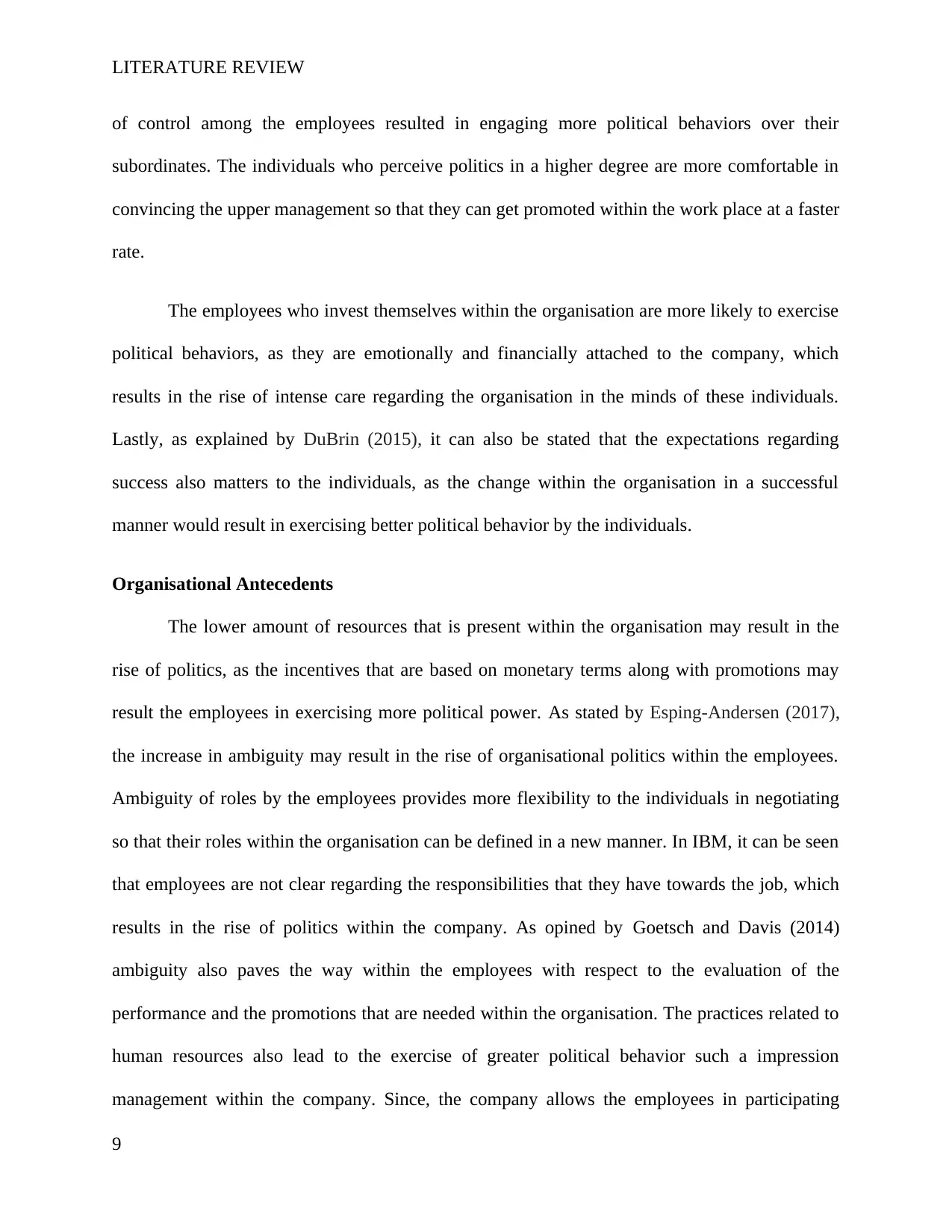
LITERATURE REVIEW
of control among the employees resulted in engaging more political behaviors over their
subordinates. The individuals who perceive politics in a higher degree are more comfortable in
convincing the upper management so that they can get promoted within the work place at a faster
rate.
The employees who invest themselves within the organisation are more likely to exercise
political behaviors, as they are emotionally and financially attached to the company, which
results in the rise of intense care regarding the organisation in the minds of these individuals.
Lastly, as explained by DuBrin (2015), it can also be stated that the expectations regarding
success also matters to the individuals, as the change within the organisation in a successful
manner would result in exercising better political behavior by the individuals.
Organisational Antecedents
The lower amount of resources that is present within the organisation may result in the
rise of politics, as the incentives that are based on monetary terms along with promotions may
result the employees in exercising more political power. As stated by Esping-Andersen (2017),
the increase in ambiguity may result in the rise of organisational politics within the employees.
Ambiguity of roles by the employees provides more flexibility to the individuals in negotiating
so that their roles within the organisation can be defined in a new manner. In IBM, it can be seen
that employees are not clear regarding the responsibilities that they have towards the job, which
results in the rise of politics within the company. As opined by Goetsch and Davis (2014)
ambiguity also paves the way within the employees with respect to the evaluation of the
performance and the promotions that are needed within the organisation. The practices related to
human resources also lead to the exercise of greater political behavior such a impression
management within the company. Since, the company allows the employees in participating
9
of control among the employees resulted in engaging more political behaviors over their
subordinates. The individuals who perceive politics in a higher degree are more comfortable in
convincing the upper management so that they can get promoted within the work place at a faster
rate.
The employees who invest themselves within the organisation are more likely to exercise
political behaviors, as they are emotionally and financially attached to the company, which
results in the rise of intense care regarding the organisation in the minds of these individuals.
Lastly, as explained by DuBrin (2015), it can also be stated that the expectations regarding
success also matters to the individuals, as the change within the organisation in a successful
manner would result in exercising better political behavior by the individuals.
Organisational Antecedents
The lower amount of resources that is present within the organisation may result in the
rise of politics, as the incentives that are based on monetary terms along with promotions may
result the employees in exercising more political power. As stated by Esping-Andersen (2017),
the increase in ambiguity may result in the rise of organisational politics within the employees.
Ambiguity of roles by the employees provides more flexibility to the individuals in negotiating
so that their roles within the organisation can be defined in a new manner. In IBM, it can be seen
that employees are not clear regarding the responsibilities that they have towards the job, which
results in the rise of politics within the company. As opined by Goetsch and Davis (2014)
ambiguity also paves the way within the employees with respect to the evaluation of the
performance and the promotions that are needed within the organisation. The practices related to
human resources also lead to the exercise of greater political behavior such a impression
management within the company. Since, the company allows the employees in participating
9
Paraphrase This Document
Need a fresh take? Get an instant paraphrase of this document with our AI Paraphraser
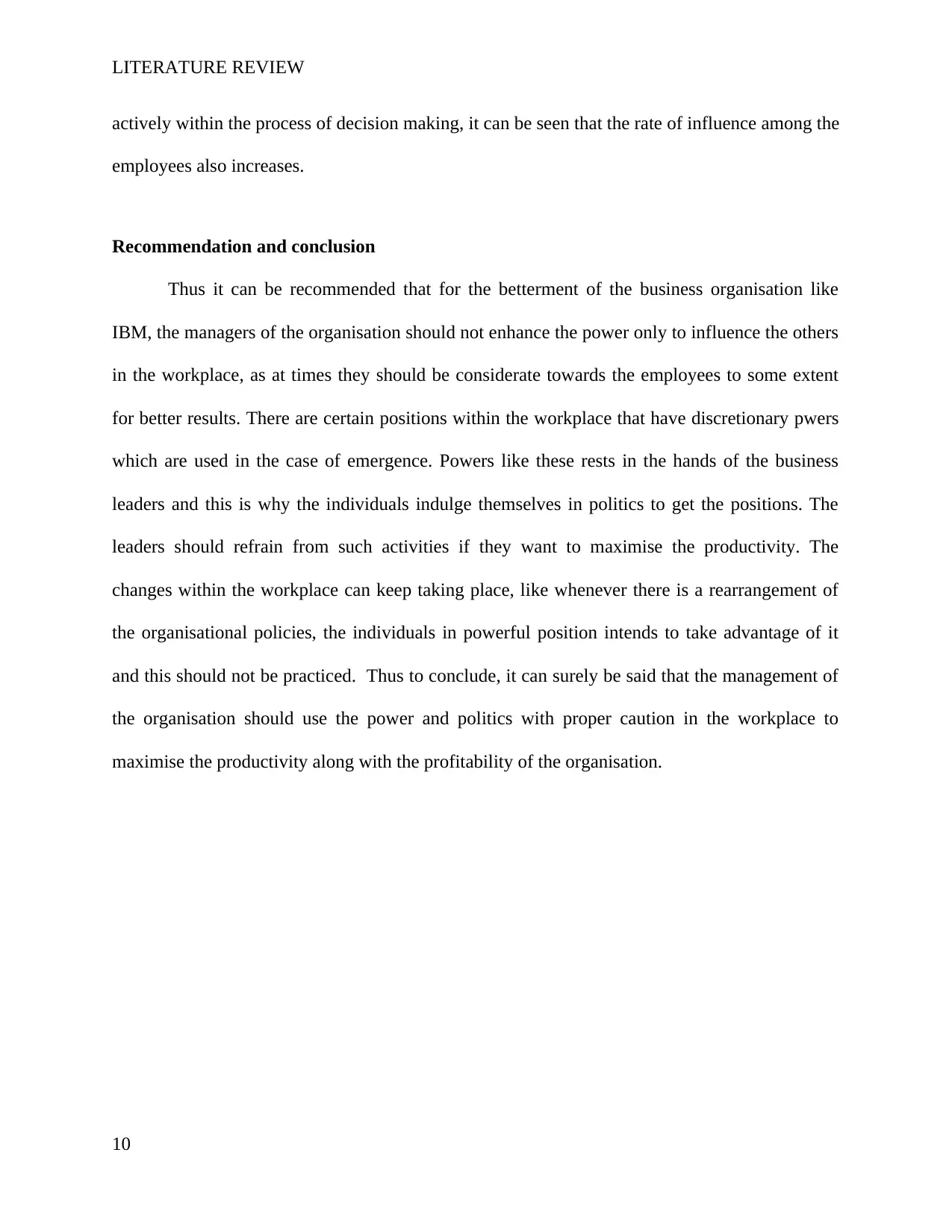
LITERATURE REVIEW
actively within the process of decision making, it can be seen that the rate of influence among the
employees also increases.
Recommendation and conclusion
Thus it can be recommended that for the betterment of the business organisation like
IBM, the managers of the organisation should not enhance the power only to influence the others
in the workplace, as at times they should be considerate towards the employees to some extent
for better results. There are certain positions within the workplace that have discretionary pwers
which are used in the case of emergence. Powers like these rests in the hands of the business
leaders and this is why the individuals indulge themselves in politics to get the positions. The
leaders should refrain from such activities if they want to maximise the productivity. The
changes within the workplace can keep taking place, like whenever there is a rearrangement of
the organisational policies, the individuals in powerful position intends to take advantage of it
and this should not be practiced. Thus to conclude, it can surely be said that the management of
the organisation should use the power and politics with proper caution in the workplace to
maximise the productivity along with the profitability of the organisation.
10
actively within the process of decision making, it can be seen that the rate of influence among the
employees also increases.
Recommendation and conclusion
Thus it can be recommended that for the betterment of the business organisation like
IBM, the managers of the organisation should not enhance the power only to influence the others
in the workplace, as at times they should be considerate towards the employees to some extent
for better results. There are certain positions within the workplace that have discretionary pwers
which are used in the case of emergence. Powers like these rests in the hands of the business
leaders and this is why the individuals indulge themselves in politics to get the positions. The
leaders should refrain from such activities if they want to maximise the productivity. The
changes within the workplace can keep taking place, like whenever there is a rearrangement of
the organisational policies, the individuals in powerful position intends to take advantage of it
and this should not be practiced. Thus to conclude, it can surely be said that the management of
the organisation should use the power and politics with proper caution in the workplace to
maximise the productivity along with the profitability of the organisation.
10
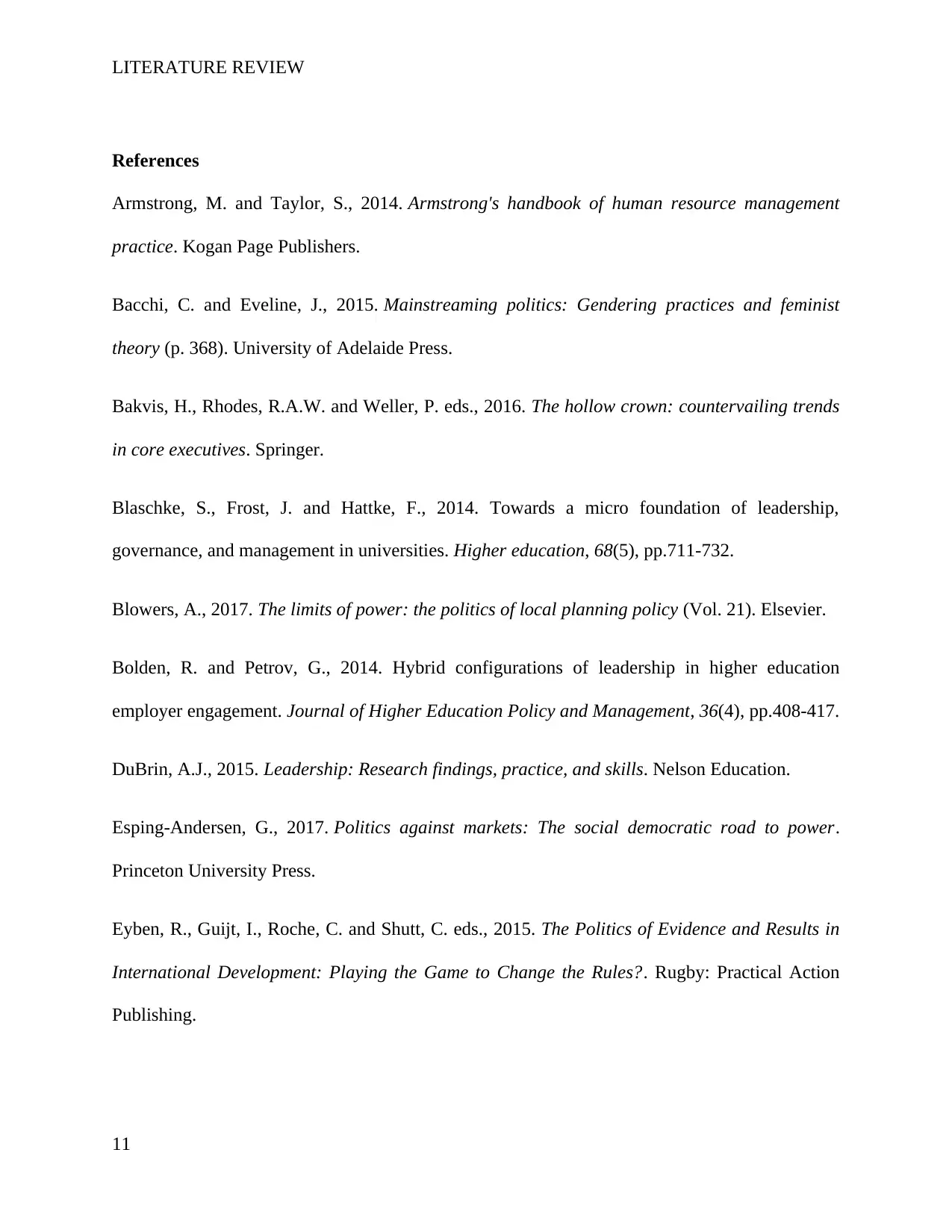
LITERATURE REVIEW
References
Armstrong, M. and Taylor, S., 2014. Armstrong's handbook of human resource management
practice. Kogan Page Publishers.
Bacchi, C. and Eveline, J., 2015. Mainstreaming politics: Gendering practices and feminist
theory (p. 368). University of Adelaide Press.
Bakvis, H., Rhodes, R.A.W. and Weller, P. eds., 2016. The hollow crown: countervailing trends
in core executives. Springer.
Blaschke, S., Frost, J. and Hattke, F., 2014. Towards a micro foundation of leadership,
governance, and management in universities. Higher education, 68(5), pp.711-732.
Blowers, A., 2017. The limits of power: the politics of local planning policy (Vol. 21). Elsevier.
Bolden, R. and Petrov, G., 2014. Hybrid configurations of leadership in higher education
employer engagement. Journal of Higher Education Policy and Management, 36(4), pp.408-417.
DuBrin, A.J., 2015. Leadership: Research findings, practice, and skills. Nelson Education.
Esping-Andersen, G., 2017. Politics against markets: The social democratic road to power.
Princeton University Press.
Eyben, R., Guijt, I., Roche, C. and Shutt, C. eds., 2015. The Politics of Evidence and Results in
International Development: Playing the Game to Change the Rules?. Rugby: Practical Action
Publishing.
11
References
Armstrong, M. and Taylor, S., 2014. Armstrong's handbook of human resource management
practice. Kogan Page Publishers.
Bacchi, C. and Eveline, J., 2015. Mainstreaming politics: Gendering practices and feminist
theory (p. 368). University of Adelaide Press.
Bakvis, H., Rhodes, R.A.W. and Weller, P. eds., 2016. The hollow crown: countervailing trends
in core executives. Springer.
Blaschke, S., Frost, J. and Hattke, F., 2014. Towards a micro foundation of leadership,
governance, and management in universities. Higher education, 68(5), pp.711-732.
Blowers, A., 2017. The limits of power: the politics of local planning policy (Vol. 21). Elsevier.
Bolden, R. and Petrov, G., 2014. Hybrid configurations of leadership in higher education
employer engagement. Journal of Higher Education Policy and Management, 36(4), pp.408-417.
DuBrin, A.J., 2015. Leadership: Research findings, practice, and skills. Nelson Education.
Esping-Andersen, G., 2017. Politics against markets: The social democratic road to power.
Princeton University Press.
Eyben, R., Guijt, I., Roche, C. and Shutt, C. eds., 2015. The Politics of Evidence and Results in
International Development: Playing the Game to Change the Rules?. Rugby: Practical Action
Publishing.
11
⊘ This is a preview!⊘
Do you want full access?
Subscribe today to unlock all pages.

Trusted by 1+ million students worldwide
1 out of 14
Related Documents
Your All-in-One AI-Powered Toolkit for Academic Success.
+13062052269
info@desklib.com
Available 24*7 on WhatsApp / Email
![[object Object]](/_next/static/media/star-bottom.7253800d.svg)
Unlock your academic potential
Copyright © 2020–2026 A2Z Services. All Rights Reserved. Developed and managed by ZUCOL.





